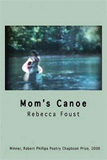September 10, 2009MOM’S CANOE
Review by Joan Gelfand
Texas Review Press
John H. Lindsey Building
Lewis Street
4354 TAMU
College Station, Texas 77843-4354
ISBN-13 978-1933896274
2009, 40 pp., $12.95
http://www.amazon.com
A quarry littered with shards of broken glass and trash; a canoe gliding effortlessly down a clean river; the revelation of blue black mountains; witnessing a beloved parents’ abuse. In Mom’s Canoe author Becky Foust traverses landscapes fertile and lush as a meadow bursting with wildflowers, and as barren and sad as a broken porch, a falling down shed.
We are drawn into this gorgeous chapbook by its cover – a seductively posed figure poised in waist-high water. The image is sensual, evocative, but we soon learn that it represents precisely one calm moment; a flash of a sweet memory, and that beauty is not the primary aesthetic that informs Mom’s Canoe. In Foust’s hardscrabble mining-town-on-the-decline world, beauty is fleeting and pleasures don’t last long: “Scotch straight-up, thy neighbor’s/wife and Sunday church – /Nobody’s talking/but one white glove is lost….The shards meet to make/a pot you haven’t seen before. The walls are half-effaced” (from “Archeological Record”).
Here Foust gives us skillful layering, and suggestive writing that is the stuff of great poetry. We see people exiting a church, imagine a clandestine affair, and also a birth, of sorts, in process. Foust takes the time to exquisitely paint and then introduce us to characters whose stories are seldom told; they’re too caught up in life’s dramas for reflection.
Even the children in Foust’s chapbook are already rough and hardboiled, challenged from within and without, as in “The Bees Are Inside”:
Casey and kin were dawn and night, a bright
crystalline thing born out of darkness
and chaos. Inbred they called him and worse
and sometimes he heard them I saw
a cursed angel or changeling
flung headlong from God and then from a tree…
Foust is relentless in her honesty, unpacking the connections we all hope to be deep and lasting and showing us how thin they are in this world, between lovers, between family members, husbands and wives, parents and children–and brothers and sisters too. In fact, love is barely audible between the fights, the garbage and the struggle to survive. The agony is here, but not the ecstasy. Foust escapes this world, but, as we see in“Altoona to Anywhere,” it haunts her:
Go ahead, aspire to transcend
your hardscrabble roots, bootstrap
the life you dream on…
But when you’ve left it behind you
May find it still there, in your dreams,
Your syntax, the smell of your hair,
Its real smell, under the shampoo.
Foust employs poetic devices judiciously, using internal rhyme and enjambment to echo feelings and images: “Do you remember your old canoe? Wooden wide-bellied, tapered ends, made to slip through tight river bends, swiftly like shadow” (from “Mom’s Canoe”).
Many first lines are strong, grabbing us into a complicated world thick with regret, sentiment and seething rage:
“Hooked, jerked up from all/it knew; fluid, muted milieu.”
“The crickets are sounding a catastrophe.”
“When you’ve gone, it won’t matter to the musk rose.”
Last lines generally pack a punch but can often be too literal. This, from “Things Burn Down”: “If you don’t get it by now, don’t ask.”
On balance, under Foust’s restrained and disciplined hand, poems are delivered in tight, exacting packages. The small packages make sense because in this landscape, the only characters allowed to inhabit much space at all are the Allegheny Mountains. People are raised to toe the line, keep life and limb together, help each other at any cost.
Mom’s Canoe is an important record of jobless frustrations, closed mines (and closed minds) and the hard drinking that covers it all up. Foust, literate, sophisticated, takes the underbelly of America that doesn’t produce many poets at all and slices it open, creating haunting poetry:
From “How the Fish Feels”: “Laid wide open, butterflied;/broken-booked, spine revealed, /entrails tangled overboard.”